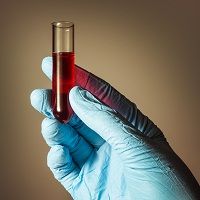Baseline Interferon Ratio Predicts Response to anti-TNF Therapy
A blood test may offer a reliable way to identify rheumatoid arthritis patients who are unlikely to respond to anti-tumor necrosis factor-alpha inhibitors, speeding treatment with other drugs and lowering costs.

A blood test may offer a reliable way to identify rheumatoid arthritis patients who are unlikely to respond to anti-tumor necrosis factor-alpha inhibitors, speeding treatment with other drugs and lowering costs. The study outlining these findings was presented here at the 2014 annual meeting of the American College of Rheumatology.
The study showed that a pre-treatment serum ratio of interferon-beta to interferon-alpha greater than 1.3 was associated with a lack of response.
“It is clear that different rheumatoid arthritis patients respond to different therapies, and yet we do not understand the biological differences between patients that cause this variable response, or have methods for predicting which treatment will best suit a particular patient,” said lead author Timothy Niewold, MD, of the Mayo Clinic in Rochester, Minnesota.
The need for such a predictor is especially acute with the TNF-alpha inhibitors, he said, since they are widely used and are expensive, but there is a large proportion of patients who don’t respond.
Niewold said he and his colleagues chose to study serum levels of interferon-alpha and —beta, “because there is a lot of variation between people in the levels of these proteins, and they remain relatively stable,” making them potentially valuable discriminators among patients.
The researchers measured levels of both proteins in a study set of 32 RA patients before they began TNF-alpha inhibitors, and then monitored their response to therapy. They found that IFN-beta/IFN-alpha > 1.3 was associated with lack of response at 14 weeks. The same cut-off ratio was a significant predictor of non-response in a validation set of 80 patients, where no patient with a ratio above 1.3 achieved a good response to treatment.
The odds ratio for the cut-off as a predictor of non-response versus good response was 18.0, and for non-response versus moderate or good response it was 4.3, both highly significant.
The predictive value of the cut-off was independent of anti-CCP antibody titer or whether the TNF-alpha inhibitor was a monoclonal antibody or a decoy receptor.
“We want to get disease under control quickly, and it would be very clinically usefulto have predictors of response,” Niewold said. “We are excited that this may be a good predictor.”
He cautioned that the test requires validation in larger group, and that advances are likely to be needed to streamline the interferon assay before it becomes clinically widely available.